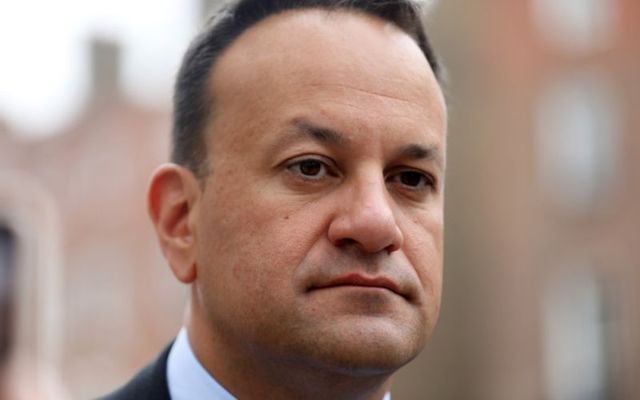The burning of a photograph of Taoiseach (Irish leader) Leo Varadkar and an Irish tricolor on a loyalist bonfire in Tyrone is being treated as a hate crime by the PSNI.
A towering pyre in Moygashel, County Tyrone, attracted attention online after a boat referencing the Good Friday Agreement was placed on top of it.
"Good Friday Agreement? That ship has sailed," said a slogan on the side of the boat.
However, an Irish tricolor and republican flag were added to the bonfire on Saturday evening in addition to a photograph of Taoiseach (Irish leader) Leo Varadkar.
The pyre also included a mock copy of the 1998 Good Friday Agreement with the words "null and void" printed across it.
PSNI Chief Inspector John Keers said Northern Irish police had received reports of material being placed on a bonfire in Moygashel and are treating it as a hate crime.
Varadkar said he has seen images of his photograph on the bonfire but said he believes it does not represent the majority of unionists in Northern Ireland.
The Taoiseach added that the actions of a small minority of unionists would not distract the Irish Government from its ongoing efforts to set the Good Friday Agreement working again.
The bonfire was called the "No Irish Sea Border Bonfire" in reference to loyalist protests against the Northern Ireland Protocol, which aimed to resolve post-Brexit trade disputes by implementing checks at Northern Irish ports for goods coming from Britain.
The bonfire was set alight shortly after 11 p.m. on Saturday after an address by controversial loyalist activist Jamie Bryson.
The bonfire received significant criticism, including from Ulster Unionist Party leader, Doug Beattie.
"This is not acceptable, it is childish and promotes hate. Again the many are let down by a few," Beattie said in a tweet.
DUP MP Carla Lockhart said that she didn't want to see "bonfires with eulogies or effigies or flags on them".
Fine Gael TD and former Minister for Justice Charlie Flanagan described the burning of the tricolor and Varadkar's photograph as "gratuitously offensive and unacceptable".
"Such naked sectarianism has no place on the challenging path to peace, stability, and reconciliation & must be condemned by all democrats," Flanagan wrote on Twitter.
Burning the National flag of a friendly neighbour & its head of government is gratuitously offensive & unacceptable. Such naked sectarianism has no place on the challenging path to peace, stability & reconciliation & must be condemned by all democrats. https://t.co/KmXchuYYHQ
— Charlie Flanagan (@CharlieFlanagan) July 9, 2023
The majority of bonfires in Northern Ireland will be lit on July 11 ahead of the unionist community's traditional 12th of July celebrations.
The 12th of July celebrates King William of Orange's victory over the Catholic King James II at the Battle of the Boyne in 1690, ensuring a Protestant line of succession for the British crown.
In recent years, several loyalist bonfires have incited controversy in Northern Ireland.
In 2022, a loyalist bonfire in Cregagh, County Down, included several election posters and Irish flags in addition to a poster stating that "All Taigs are Targets".
A year earlier, politicians on both sides of the political divide in Northern Ireland criticized the burning of Irish flags and election posters ahead of the 12th of July celebrations.




Comments